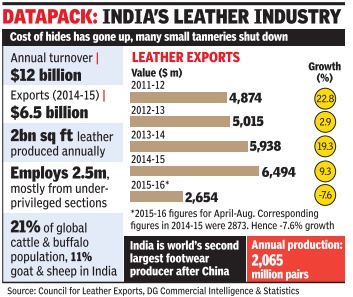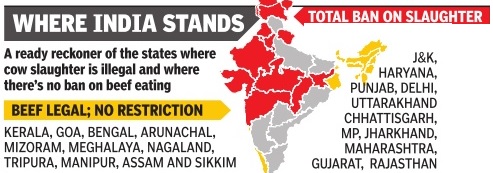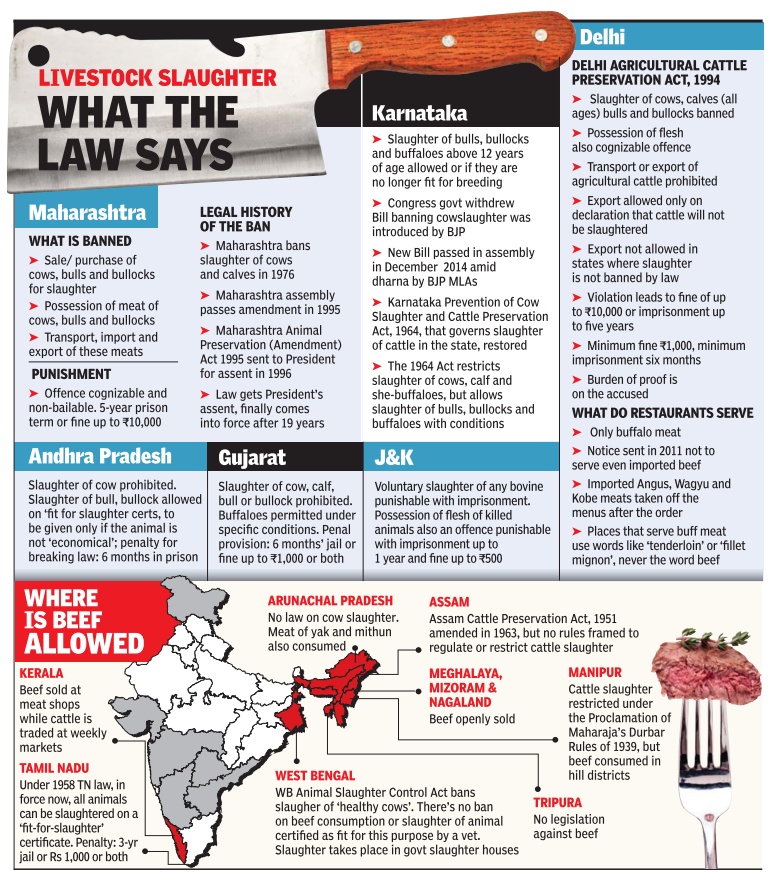Cow slaughter: India
(→2015-16) |
(→Early 1900s Lucknow: Maulana Abdul Bari’s decision) |
||
| Line 115: | Line 115: | ||
On May 9, Justice Fateh Deep Singh of the Punjab and Haryana high court ordered a CBI probe into the role of vigilante groups. The HC observed: “Such groups have no legal backing... the court cannot shut its eyes and allow state police to give fillip... under the garb of protecting animals.“ Inputs: Palak Nandi, Nitesh Kumar Sharma and Ashis Mehta in Jaipur , Shalabh in Lucknow, Faiz Rahman Siddiqui in Kanpur , Arvind Chauhan in Agra, Binay Singh in Varanasi, IP Singh in Jalandhar , Alok Mishra in Ranchi, Suchandana Gupta in Bhopal | On May 9, Justice Fateh Deep Singh of the Punjab and Haryana high court ordered a CBI probe into the role of vigilante groups. The HC observed: “Such groups have no legal backing... the court cannot shut its eyes and allow state police to give fillip... under the garb of protecting animals.“ Inputs: Palak Nandi, Nitesh Kumar Sharma and Ashis Mehta in Jaipur , Shalabh in Lucknow, Faiz Rahman Siddiqui in Kanpur , Arvind Chauhan in Agra, Binay Singh in Varanasi, IP Singh in Jalandhar , Alok Mishra in Ranchi, Suchandana Gupta in Bhopal | ||
=Muslim opposition to cow slaughter= | =Muslim opposition to cow slaughter= | ||
| + | ==Early 1900s: Maulanas issue fatwas against cow slaughter== | ||
| + | ''' Voices that put harmony over discord ''' | ||
| + | |||
| + | Prior to Maulana Abdul Bari Ferangi Mahali, his ancestors had twice issued appeals to their followers against cow slaughter on Bakrid, declaring that it was not an obligation under Islam. In the early 1900s, Maulana Abdul Hai Ferangi Mahali (Bari's cousin), Maulana Abdul Wahab (Bari's father), Qazi Syed Mohammad Hasan, and Maulana Abul Haya Mohammad Abdul Hameed had issued fatwas stating cow slaughter is not obligatory and those giving it up will not be sinners--as mentioned in `Tark-e-Qurbani-e-Gao', the book by Khwaja Hasan Nizami Dehelvi printed in August 1921. In 1911, Maulana Hai and Maulana Wahab signed another fatwa stating that if cow slaughter hurts sentiments and creates disharmony, it should be given up, for it is not a part of Islamic law. | ||
==Early 1900s Lucknow: Maulana Abdul Bari’s decision== | ==Early 1900s Lucknow: Maulana Abdul Bari’s decision== | ||
[http://timesofindia.indiatimes.com/city/lucknow/Lucknows-Muslims-said-no-to-cow-killing-100-years-ago/articleshow/54285929.cms Lucknow's Muslims said no to cow killing 100 years ago, TNN | Sep 12, 2016, The Times of India] | [http://timesofindia.indiatimes.com/city/lucknow/Lucknows-Muslims-said-no-to-cow-killing-100-years-ago/articleshow/54285929.cms Lucknow's Muslims said no to cow killing 100 years ago, TNN | Sep 12, 2016, The Times of India] | ||
Revision as of 09:47, 12 September 2016


This is a collection of articles archived for the excellence of their content. |
Contents |
10 facts about beef in India
The Times of India, May 29 2015
1 States where cow slaughter is banned: Maharashtra, Haryana, Uttar Pradesh, Tamil Nadu, Rajasthan, Punjab, Odisha, Puducherry, Madhya Pradesh, Karnataka, Jammu & Kashmir, Himachal Pradesh, Gujarat, Delhi, Bihar and Andhra Pradesh
2 Bulls and buffaloes are sold and eaten in most states even where cow slaughter is banned.Karnataka, for example, allows slaughter of bulls and buffaloes above 12 years
3 But some states like Haryana, Rajasthan, Punjab, J&K and Himachal Pradesh have more stringent laws that ban the slaughter of all
4 West Bengal permits slaughter of cows, bulls and buffaloes over the age of 14 but requires a `fit for slaughter' certificate
5 Daman & Diu and Goa permit slaughter of those cows which are old or sick, or for medical purposes
6 Kerala is believed to be India's most beef-friendly state.There is no state legislation banning cow slaughter & dishes like `beef fry' and `beef chilli' are available at roadside stalls too
7 States like Kerala, Manipur, Mizoram, Meghalaya, Arunachal & Nagaland allow slaughter of cattle with no certificate required
8 Despite the bans, India is only second to Brazil when it comes to exporting beef, but most of it is buffalo meat. It is also the fifth-largest producer
9 India's beef ship ments till Oct last year rose to 1.95 million tonnes, 5% more than for the whole of 2013, according to the US department of agriculture
10 It is said that over a quarter of India's population of Scheduled Tribes & Scheduled Castes eat beef. Consumption is also prevalent across all sections of society in states where cow slaughter is legal
Laws on cow slaughter
The Hindu, May 2, 2015
The Bombay High Court recently upheld the Maharashtra government’s decision to ban sale and consumption of beef in the State. The move has triggered debates across India on vegetarianism, tolerance towards other foods and also whether the State has a right to tell people what they should eat. A look at the debate surrouding the ban and also the consumption of the meat in other parts of the country.
Fully banned
Andhra Pradesh, Telangana , Bihar, Chattisgarh, Delhi, Goa, Gujarat, Haryana, Himachal Pradesh, J&K, Jharkhand, Karnataka, Madhya Pradesh, Maharashtra, Punjab, Rajasthan, Uttar Pradesh, Uttarakhand
Allowed with slaughter certificates
Assam, Tamil Nadu, West Bengal
No ban
Arunachal Pradesh, Kerala (animals above 10 years), Manipur, Meghalaya, Mizoram, Nagaland, Sikkim, Tripura
Bull slaughter: Maharashtra
Maha extends cow slaughter ban to bulls
Mohammed Wajihuddin & Priyanka Kakodkar The Times of India Mar 04 2015


Law Violators Will Face 5-Yr Jail, Rs 10k Fine
Beef-steak and beef chilli fry are going to be off the menus in this world city with Maharashtra's new law which extends the existing ban on cow slaughter to bulls and bullocks.This means that across the state only buffalo meat can be eaten or served, whether it is in the privacy of your home or in a fivestar hotel. Those who violate the law face up to five years in jail and fines up to Rs 10,000.
The fine print of the Maharashtra Animal Preservation (Amendment) Act 1995, which received presidential assent this week, shows just how stringent the ban is. It prohibits the very possession of these meats. Their import and export is banned. So is the transport, sale or purchase of cows, bulls and bullocks for the purpose of slaughter.
Beef is priced at just half the rate of mutton and is the most affordable red meat. It enjoys a large market with roughly 9 lakh kilograms consumed in the city daily .Of this roughly 80% is beef and 20% is buffalo meat, beef traders say . Around 450 large animals are slaughtered daily at the Deonar abbatoir in the city.
The state contributes around 25% to the country's beef and buffalo meat market. Less beef in the market could drive up prices of mutton and chicken, traders say .
Maharashtra had banned the slaughter of cows and calves in 1976. The new law extends the ban to bulls and bullocks. It only excludes female buffaloes and their calves. Several states have already enacted similar laws.
With the “protection of cows and their progeny“ on the BJP's manifesto, the Devendra Fadnavis government actively pushed to get the law enacted. It had been passed by the Maharashtra assembly 19 years ago and was awaiting presidential assent.
2015: Haryana doubles punishment
The Times of India, Nov 13 2015
Sukhbir Siwach
Prez clears Haryana's anti-beef bill
Almost eight months after the Haryana assembly cleared a bill against cow slaughter, it has finally got the President's assent.The law carries a provision of up to 10 years' jail term for offenders. The state assembly had in March proposed doubling the current jail term of five years for those found involved in cow slaughter. The bill has also proposed a fine up to Rs 1 lakh for cow slaughter apart from jail term.
Cow vigilantism
2015-16
The Times of India, Jun 21 2016

Cow vigilante groups are now a law unto them selves, assaulting and killing alleged cattle smugglers, gheraoing police stations. Policemen, equally , are at the receiving end of the violence from cattle smugglers. Since September last, when a Muslim was lynched near Dadri on Delhi's outskirts for allegedly possessing cow meat, vigilantism has become rampant, reports from TOI correspondents across states such as Jharkhand, Punjab, Haryana, Rajasthan and UP say .
The shocking incident in Jharkhand's Latehar district, where two alleged cattle traders were thrashed and hanged, made front page news this March. But many cow vigilantism incidents go unnoticed.
Former Jharkhand CM Babulal Marandi sums it up: “In the last six months, harassment of cattle traders has increased manifold. They're beaten up in the name of cow protection. Fear has made many abandon their trade; they're jobless.“
Punjab Dairy Farmers Association president Daljit Singh says vigilantism has affected transportation of cows and adversely impacted diary business. Last April, a video depicting the torture of Punjab cattle smugglers surfaced on social media. Another clip showed Gau Raksha Dal workers flaunting weapons and bulletproof jackets.
Elsewhere, the picture is equally grim. Last month in Rajasthan's Pratapgarh, alleged cattle smugglers were stripped, kicked and tortured in the presence of policemen.Authorities often pamper the cattle protection mobs. On June 6, when over 400 Gau Raksha Dal workers blocked a national highway and gheraoed a police station demanding the release of five vigilantes, senior Pratapgarh police officers transferred SHO Kailash Chand. He'd arrested vigilantes accused of thrashing alleged cow smugglers.
Cow smugglers are no less menacing. On June 3, a chowk idar who tried to rescue cattle was killed allegedly by the smugglers in UP's Azamgarh.Weeks earlier, when police intercepted a truck ferrying cows in Rajasthan's Alwar, the smugglers opened fire.
In this cauldron of violence, rightwing groups are upfront. “If police and administration don't act, others will be forced to. We don't support violence, but cattle smugglers can't have a free run,“ says Sunil Singh, president, Hindu Yuva Vahini (HYV), an outfit founded by Gorakhpur MP Adityanath. HYV's members guard the UP-Bihar border, the route smugglers take for the northeast and Bangladesh.
District president Shiv Sena Muzaffarnagar, Yogender Sharma, claims they tackle two or three cattle smuggling incidents monthly while a local officer concedes: “ At times it's difficult to save culprits from the aggressive Hindu groups.
“We want the cow to be declared Rashtra Mata,“ Jharkhand activist Suresh Ram says. In 2012 he was jailed for assaulting a Muslim who, he claimed, was “a cattle smuggler“. Posters distributed in the eastern state often suggest cattle traders should be hanged.
The police have an unenviable task. UP's DIG Meerut range Laxmi Singh says, “We are vigilant. Cow slaughter creates law and order problems. Special teams have been formed to book those slaughtering cows and the protection groups from taking law into their hands.“
On May 9, Justice Fateh Deep Singh of the Punjab and Haryana high court ordered a CBI probe into the role of vigilante groups. The HC observed: “Such groups have no legal backing... the court cannot shut its eyes and allow state police to give fillip... under the garb of protecting animals.“ Inputs: Palak Nandi, Nitesh Kumar Sharma and Ashis Mehta in Jaipur , Shalabh in Lucknow, Faiz Rahman Siddiqui in Kanpur , Arvind Chauhan in Agra, Binay Singh in Varanasi, IP Singh in Jalandhar , Alok Mishra in Ranchi, Suchandana Gupta in Bhopal
Muslim opposition to cow slaughter
Early 1900s: Maulanas issue fatwas against cow slaughter
Voices that put harmony over discord
Prior to Maulana Abdul Bari Ferangi Mahali, his ancestors had twice issued appeals to their followers against cow slaughter on Bakrid, declaring that it was not an obligation under Islam. In the early 1900s, Maulana Abdul Hai Ferangi Mahali (Bari's cousin), Maulana Abdul Wahab (Bari's father), Qazi Syed Mohammad Hasan, and Maulana Abul Haya Mohammad Abdul Hameed had issued fatwas stating cow slaughter is not obligatory and those giving it up will not be sinners--as mentioned in `Tark-e-Qurbani-e-Gao', the book by Khwaja Hasan Nizami Dehelvi printed in August 1921. In 1911, Maulana Hai and Maulana Wahab signed another fatwa stating that if cow slaughter hurts sentiments and creates disharmony, it should be given up, for it is not a part of Islamic law.
Early 1900s Lucknow: Maulana Abdul Bari’s decision
Lucknow's Muslims said no to cow killing 100 years ago, TNN | Sep 12, 2016, The Times of India
Adnan Abdul Wali, a descendant of Maulana Abdul Bari Ferangi Mahali in the cityAdnan Abdul Wali, a descendant of Maulana Abdul Bari Ferangi Mahali in the city
LUCKNOW: Muslims in Lucknow had voluntarily given up cow slaughter on Eid-ul-Zuha (Bakrid) almost a century ago, long before the Uttar Pradesh Prevention of Cow Slaughter Act of 1955 was even thought of.
The practice that has been kept alive ever since, was also validated by the Sri Dharma Bharat Mahamandal, established in 1887 by Pandit Madan Mohan Malviya, and by Mahatma Gandhi in his letter to the Mumbai edition of the Times of India on September 6, 1919.
Under the leadership of Maulana Abdul Bari Ferangi Mahali, a freedom fighter and prominent figure of the Khilafat Movement along with the Ali brothers, a wave of abstinence from cow slaughter during Bakrid started to build. Previous efforts had also been made by Bari's ancestors, but were marred time and again.
Penning his conversation with Maulana Bari, Mahatma Gandhi (who referred to Bari as his brother) in his letter to TOI also emphasised how the step was unconditional and how the Maulana enjoyed massive following, even though Hindus were unwilling to support the Khilafat movement. And as the Mahatma writes, true to his word, the Maulana after his conversation with Gandhi, started "preaching amongst his followers and friends the necessity of abstaining from cow-killing." That very day in 1919, Gandhi had also received a telegram from Maulana Bari (that is referred to in the letter) stating: "In celebration of Hindu-Muslim unity, no cow sacrifices in Ferangi Mahal this Baqreid-Abdul Bari."
And not just in Ferangi Mahal, a letter to Maulana Bari on January 10, 1920 from the Sri Bharat Dharma Mahamandal thanked him profusely for his "efforts through speech and abstention himself, that in the days of Baqreid there was no cow-killing in Lucknow."
A Sufi and an Aalim (scholar), as author and historian, Gail Minault wrote in her book 'The Khilafat Movement', Bari had "religious influence over a variety of followers, and a large group of disciples from the Northwest to Bengal to Madras."
But it was not out of pressure that the unifying step was adopted by Muslims under his leadership. In his speech at a Hindu-Muslim conference on January 15, 1920 in Saharanpur, Maulana Bari had said, "No Hindus, nor Mahatma Gandhi have requested me to stop cow slaughter, but with my own heartfelt desire for unity and not to hurt the sentiments of my Hindu brothers, I have stopped doing so."
Later, following Bari's footsteps, some senior members of the Muslim League had also agreed to avoid cow slaughter during Bakrid in other parts of the state too.
